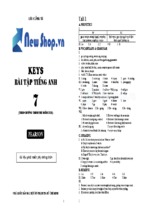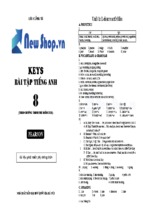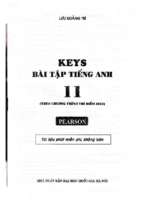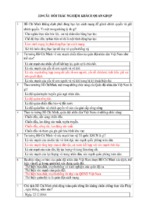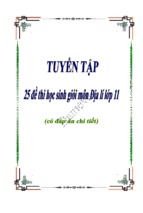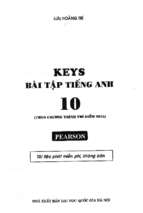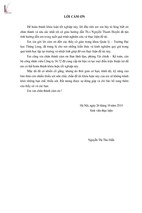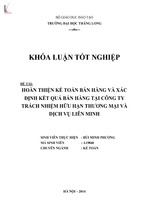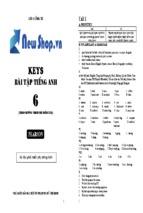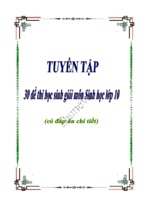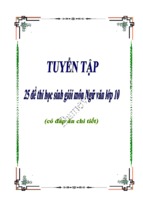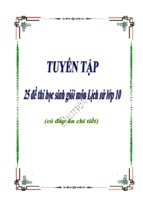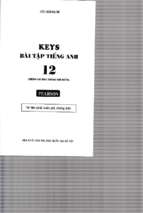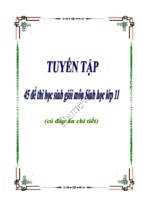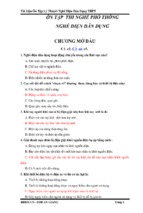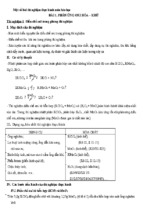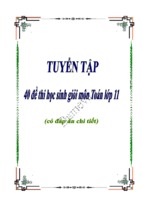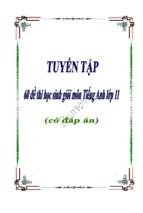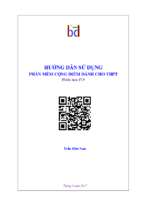PART ONE: INTRODUCTION
I. RATIONALE OF THE STUDY
Today, English is an important communication tool in the integration with
the regional and international communities. It is an access to information of
science, engineering. Our country is on the path of innovation. We are committing
to industrialization and modernization of the country. We are also expanding
relations with other countries. Especially since Vietnam joined the WTO, English
has been used more and more widely in Vietnam. Thus, teaching and learning
foreign languages in general and English in particular are being carried out
seriously by all schools.
Recognizing the important role of English, teachers of English at secondary
level are responsible for equipping students with basic knowledge of language so
that they can do well in English at secondary level and they can communicate
with foreigners. We always try to advance in our professional work, getting
experiences from other teachers, colleagues, as well as exploring creative
teaching methods to improve the quality of teaching. During the process of
teaching English at Nhu Thanh 2 high school, the colleagues and I have faced
many difficulties in teaching of reading skills, especially the part of while reading
in each unit. Students at Nhu Thanh 2 high school coming from remote and
mountainous areas often have psychological problems such as being afraid of
learning foreign languages and lack of positive reading attitudes when they read
long passages printed with unfamiliar words in the text. Moreover, in the
examinations for GCSE, reading questions account for 40% with multi- choice
exercises. So I myself recognized the need of adapting tasks in textbooks in order
to improve students’ reading skills.
Therefore, in this study I would like to mention the issue “Improving
reading skills for students through adapting multi- choice exercises for whilereading period in English12” in the basic programme.
II. AIMS OF THE STUDY
I do this research to investigate how students at Nhu Thanh 2 high school
use the language knowledge they have learnt to develop the reading comprehension
skills through tasks of reading skills in textbooks, as well as in the examinations for
GCSE. So I decide to name my research as “Adapting multi-choice exercises in
while-reading part to improve grade-twelve students’ reading skills at Nhu
Thanh 2 high school.”
III. RESEARCH QUESTIONS
This study aims at finding answer to the following research question:
How can multi- choice exercises help the students at Nhu Thanh 2 High
School improve their reading skills?
The question has been addressed to two of the classes (12B3 and 12B6)
that I have been teaching in Nhu Thanh 2 High School with the aim to examine
how multi- choice exercises affect the process of reading here.
IV. METHODS OF THE STUDY
- Using textbooks and references
3
- Observation method
- Experimental method
- Survey methodology
PART TWO: DEVELOPMENT
CHAPTER 1: LITERATURE REVIEW
I. OVERVIEW OF READING SKILL
1. What is reading?
Establishing a clear definition of reading provides an important perspective
for evaluating approaches to teaching reading skills. Most educators would agree
that the major purpose of reading should be the construction of comprehending
and actively responding to what is read. Two of the most widely cited and agreedupon definitions of reading are the following: According to Joan P Gipe, 1991
(“Corrective reading techniques for the classroom teachers”), reading is the
process of constructing meaning from written texts. It is a complex skill requiring
the coordination of a number of interrelated sources of information. The second
definition is that reading is the process of constructing meaning through the
dynamic interaction among: (1) the reader's existing knowledge; (2) the
information suggested by the text being read; and (3) the context of the reading
situation.
Mackay (1968), in his book Reading in a Second Language, reminds
teachers that the most important objective in the reading class should NOT be
the testing of the student to see if they have understood. Teachers should instead
of spend most of the time training the students to understand what they read.
In high schools, reading is one of the four basic skills that are emphasised
in the language teaching process. Reading is not only an effective purpose but
aslo a necessary means for students to master, strengthen linguistic knowledge,
expand their vocabulary and deeply understand the style and usage of the
language they are learning.
2. What are reading skills?
Teaching reading skills is not only simply to help students understand a
text in particular, but also to help students improve basic reading skills. These
skills that are neccesary for high school students may be mentioned as follow:
+ Reading for gist.
+ Deducing the meaning of unfamilar lexical items.
+ Skimming to get general information
+ Scanning to locate specifically required information.
These are necessary skills that can help high school students understand
different passages with the different purposes. The teacher's roles are to support,
suggest and guide students to involve in reading activities through various tasks.
CHAPTER 2: PRACTICAL SITUATIONS
I. METHODS OF THE STUDY
4
The research is done qualitatively in the context of two classes (12B3 and
12B6 – at the beginning of school year 2017-2018 at Nhu Thanh 2 High School).
In this survey, I use the survey questionnaire for students. This survey is designed
to collect information for the study on “An investigation into the reality of
teaching and learning English reading skills at Nhu Thanh 2 High School.”
II. THE REALITY OF TEACHING AND LEARNING ENGLISH
READING SKILLS AT NHU THANH 2 HIGH SCHOOL
In Nhu Thanh 2 high school, students coming from remote and
mountainous areas often have psychological problems such as being afraid of
learning foreign languages and lack of positive reading attitudes when they read
long passages printed with unfamiliar words appearing in the text. Most students
are bad at silent reading methods used to capture the main ideas. They tend to
focus on interpreting individual words into Vietnamese and limitedly focus on
identifying the content of the entire article. Moreover, students always use “Guide
books to learn English well” to do the exercises in the textbooks. Although they
seem to do the given tasks in the text books well, they do not really understand
the reading texts.When class is over, all knowledge that the students have just
learned can be immediately forgotten.
Another reason that makes reading lessons unattractive to students is the
exercises in textbooks are not diverse. There are a few tasks which are repeatedly
used. The most common ones which are frequently used in reading skills at many
Upper Secondary schools are: Question- answer; Gap- filling and True- false.
Among the three tasks above, the question- answer task seems to be most usually
used in classes. They can be employed after the language teacher explains
vocabulary and structures. These tasks to some extents have satisfied the purposes
of teaching reading skills because they help students understand and master the
ideas in the reading texts. However, if these tasks are repeatedly applied in any
reading classes, what will happen? Students may feel bored and less interested in
the lessons. So it is hard for teachers to involve students in her teaching as well as
make the teaching procedure effective anymore.
More importantly, it is really neccesary for teachers to design multichoicequestion exercises for 12th grade students so that students can prepare well for the
coming examinations. In English tests in the examinations for GCSE, reading
questions account for 20 ones in the total of 50 questions. If students do not
practise doing this kind of exercise regularly, it is likely that they will not get
good results. In fact, there are only two multi- choice exercises in unit 10 and unit
15 in English textbook 12. Therefore, it is very essential for teachers to adapt
more multi- choice exercises so that students will have more chances to improve
reading skills such as reading for gist, deducing meanings of words from context,
scanning and skimming.
In the early school year, I did two surveys in class 12 B3 and 12B6 at my
school to check students’ abilities of reading: The first survey was done to check
the ability of doing given exercises in textbooks and the second one was done to
5
check the ability of reading skills (including reading for gist, scanning and
skimming for details) (Unit 2: Cultural diversity - English 12 ).
The first survey was conducted by asking students to do task 2 in the page 22
(Unit 2: Cultural diversity - English 12 ).
Task 2: Answer the following sentences.
1. What are the four key values in the survey?
2. Who are much more concerned with physical attractiveness when choosing a
wife or a husband, the young Americans and the young Asians?
3. What are the Indian students’ attitudes on a parnership of equals?
4. Why does the American wife trust her husband to do the right thing?
5. What is the main finding of the survey?
Key:
1. They are physical attractiveness, confiding, partnership of equals, trust built on
love.
2. The young Americans.
3. The Indian students agree that a woman has to sacrifice more in a marriage
than a man.
4. (The American wife trusts her husband to do the right thing) because he loves
her not because he has to.
5. The main finding of the survey is that Asians are not as romantic as their
American counterparts
With the exercise above, I see that about 30% students get mark 9-10; 25%
students to get mark 7-8; 25% students get mark 6-7; 20% students get mark 4-5.
This result shows that students can do exercises in textbooks quite well even
when they don’t really understand the questions. What they have to do is that they
find words in the questions and realize where they are in the text and write down
the whole sentence.
In the second survey, I ask students to do an adapted task- a
multichoice exercise (Unit 2: Cultural diversity - English 12) as the following:
An adapted task: Read the text and choose the best answers.
1. Who decide on the marriage in “romantic” marriage?
A. Parents
B. A boy
C. A girl
D. The bride and the groom
2. All of the following key values are mentioned in the survey EXCEPT….
A. Trust built on love B. Confiding C. Good health
D. Physical
attractiveness
3. What does the word “They” in the sentence “They also agree that a wife
should maintain her beauty and appearance after marriage” refer to?
A. The Americans
B. The Indians C. The Chinese
D. The Asians
4. Which of the following is TRUE, according to the passage?
A. The Asians are more concerned with physical attractiveness than the
Americans.
B. Many Indian men disagree that it is unwise to confide in their wives.
C. Asian students think that marriage is a parnership of equals.
6
D. Young Americans are more romantic than their Asian counterparts.
5. What is the main idea of the passage?
A. A survey
B. Different attitudes toward love and marriage
C. Love and marriage
D. The Americans and the Asians
Key
1. D
2. C
3. A
4. A
5. B
I realize that only 15 % students get mark 9-10; 20 % get mark 7-8; 20 %
students get mark 6-7, 45 % students get mark 4-5. Although the result is not as
high as that in the first result, more students involve truly in reading activities and
they are really interested in this kind of task.
To help students improve different types of reading skill such as skimming,
scanning, I design some multi- choice exercises for reading lessons of English 12.
Through doing these exercises, students can not only understand more the
reading texts but also improve reading skills in order to help them prepare well
for the coming examinations.
CHAPTER 3: SOLUTIONS TO THE PROBLEMS
I. TYPES OF MULTI-CHOICE QUESTIONS FOR READING
COMPREHENSION EXERCISES
In the last few years, I have studied English tests in the national
examinations for GCSE and paid attention to different types of questions of
reading comprehension exercises which can be listed as the following:
1. Main idea questions
Main idea questions ask students to identify the "primary purpose" or
"main point" of the passage. In order to answer these questions correctly, students
must be able to identify the thesis of the passage and those ideas that support this
thesis. Students may be confused with a few answer choices that are supporting
ideas.
Most main idea questions look like these:
- What is the topic of this passage?
- What is the main idea expressed in this passage?
- Which title best reflects the main idea of the passage?
- What does the passage mainly discuss?
- Which of the following can best summarise the main idea of the passage?
- Which of the following most accurately states the main idea of the passage?
- The passage is primarily concerned with which of the following?
- Which of the following most accurately states the main idea of the passage?
- The primary purpose of the passage is to…
- The main point made by the passage is that…
- The author of this passage is primarily concerned with….
Main point questions ask students to identify the crux of the author's point.
When adapting exercises, the teacher must identify which ideas in the passage
play a supporting role and which idea is being supported. In many ways, this is
similar to identifying the premises and conclusion to a critical
reasoning argument. The correct answer to a main point question is often a
7
paraphrase of the conclusion or thesis statement of the passage. Common
incorrect answer choices are those that feature supporting ideas. These answer
choices are appealing to many test-takers because the material presented in them
is true and based upon the passage.
2. Detail questions
Detail questions are often prefaced by "according to the passage" or "the
passage states that". Detail questions specify smaller chunks of information than
comprehension questions.
Most of the questions that fit into this category could be called "find the
fact" as they rely on students’ ability to find a specific piece of information, often
contained in two or three sentences. The answers deal with specific, small items
in the paragraph or passage such as a number, a date, or a name.
These questions tend to be more difficult than main idea questions because
they require a more detailed recollection of the test. If necessary, students can
return to the text and quickly re-read a few sentences.
Unlike main idea questions which are more generic in their question stem,
these questions tend to incorporate an idea specific to the passage in the question
stem.
Detailed questions consist of two sub-kinds of questions: Factual questions
and negative factural questions.
* Factual questions
- According to the passage, why/ what/ how…?
- Which of the following is TRUE, according to the author?
- According to the information in paragraph 1, what…?
- It is stated in paragraph 1 that…?
* Negative factual questions
- The author mentions all of the following in the passage EXCEPT…
- Which of the following is NOT stated in the passage?
- In the passage, the author does not mention….
- According to the information in paragraph 2, which of the following is NOT
true?
In trying to identify the correct answer, it is extremely important that the
teacher sticks quite close to the text. The words "according to the passage",”
TRUE”, “EXCEPT”, “NOT TRUE” should be taken seriously. Other options that
seem logical but are not directly supported by the text.
3. Vocabulary questions
These questions ask for knowledge of vocabulary and ability of
understanding the meaning of a word or phrase.
Most vocabulary questions look like these:
- Which of the following could best be substituted for the word____in line___?
- Which of the following is CLOSEST in meaning to_____?
- The expression “____” in line____could be best replaced by?
- The word “____” in line____ is CLOSEST in meaning to which of the
following?
8
Students should focus entirely on the context driven from vocabulary to
infer the meaning of useful vocabulary words.
4. Reference questions
This is a relatively simple question, because the references are replaced by
the words in the preceding sentences.
- The word “____” in line “____” refers to?
- The pronoun “it” in line____ refers to?
- The phrase “____” in paragraph“____” refers to?
5. Inference questions
Inference questions are often prefaced by "the passage implies" or "the
author implies", where "suggests" is sometimes substituted. They not only require
students to stick closely to the text and rely on specific facts but they also ask
students to make a very small logical conclusion that is strongly implied based
upon information in the passage. Answer choices that require significant
assumptions or inferences will NEVER be correct. In some cases, the answer of
an inference question lies directly in the text and requires a very small logical step
(e.g: if the text says that " Vietnam and Thailand played in the Men Footbal Final,
the Thai Team won the gold medal", an inference would be that " Vietnamese
Team was the runner- up"). In other cases, the inference question type asks for an
answer that is often a near paraphrase of a fact in the passage or a fact that the
information in the passage rules out (e.g: if the text says that " Vietnam and
Thailand played in the Men Footbal Final, the Thai Team won the gold medal”,
students can infer that the Thai Team defeated the Vietnamese Team). In other
words, the answer to an inference question is a conclusion made in the passage.
Most inference questions look like these:
- It can be infered from the passage that…
- It can be concluded from the information in paragraph 1 that….
- Which of the following can be infered from the passage?
- In the last paragraph, the author suggests that….
- It is probable that…
- You can conclude from this paragraph/passage that ……….
- The author suggests that………
- Which is more likely to happen . . . ?
6. Questions on the author’s attitude
Questions on the author’s purpose or Tone questions ask students to
identify the attitude or mood of a specific part of the passage or of the entire
passage. A common characteristic of this question type is answer choices that are
marked by one to three word phrases containing adjectives sush as positive:
positive, negative, neutral, supportive, skeptical, suspicious. Tone questions test
students’ ability to recognize an attitude or disposition of the author, which is
signaled by the use of a handful of trigger words. To answer this question,
students should base on the sentences that express personal views of the authors
such as praise, criticism, support, doubt...
- What is the author’s opinion of____?
9
- Which of the following most accurately reflects the author’s opinion of____?
- The attitude of the author of the passage toward x is best described as one of
- The tone of the author is best described as.
7. Application questions
This is a relatively difficult question .The application question type asks
you to use the information in the passage as premises and draw a conclusion that
is not directly addressed in the passage. The key to this question type is the ability
to identify the crux of an argument and see how it relates to a similar situation.
1. The author of the passage would be most likely to agree with which of the
following?
2. Which of the following statements would provide the most logical continuation
of the final paragraph?
3. [An idea or action described in the passage] is most similar to which of the
following?
II. HOW TO ADAPT GOOD MULTI-CHOICE EXERCISES AND USE
THEM EFFECTIVELY
Basing on these main types of questions, I take notice of some tips of
adapting exercises as the follow:
Some tips of adapting multi- choice exercises
+ The teacher should use different types of multi-choice questions in an
exercise in order to develop different types of reading skills of students.
+ There should be easy, medium and difficult questions to classify
students.
+ The number of question should be 5 or 6 questions for each exercise.
Some notes when using multi- choice exercises in class
+ Adapted exercises replace given tasks in textbooks and they are used in
while- reading period.
+ Teachers should prepare the exercises on handouts and distribute them to
students.
+ Time limit for each exercise is 10 – 12 minutes.
+ Students may work individually, in pairs or in groups.
+ When asking for the feedback, teachers have students take the
information in the passage to give evidence for their answers.
III. ADAPTED EXERCISES IN ENGLISH 12
During the school year 2017- 2018, I have adapted multi- choice question
exercises and used them effectively when I taught students in two classes 12 B3
and 12 B6.
All adapted tasks in this teaching experience are described briefly in the
following table.
Units Period in program Tasks in textbook
Adapted exercise
distribution of Nhu
Thanh 2High School
Unit 1 Period 4: Reading
Task 2 (page 14)
Multi- choice questions
Unit 2 Period 11: Reading
Task 2 (page 22)
Multi- choice questions
10
Unit 3
Unit 4
Unit 5
Unit 6
Unit 8
Period 16: Reading
Period 24: Reading
Period 30: Reading
Period 35: Reading
Period 44: Reading
Unit 11 Period 61: Reading
Unit 12 Period 67: Reading
Unit 13 Period 71: Reading
Unit 14 Period 79: Reading
Unit 16 Period 93: Reading
Task 3 (page 32)
Task 2 (page 46)
Task 3 (page 54)
Task 2 (page 64, 65)
Task 2 & Task 3
(page 86)
Task 3 (page 120)
Task 2 & Task 3
(page 130)
Task 2 & Task 3
(page 140)
Task 3 (page 154)
Task 3 (page 175)
Multi- choice questions
Multi- choice questions
Multi- choice questions
Multi- choice questions
Multi- choice questions
Multi- choice questions
Multi- choice questions
Multi- choice questions
Multi- choice questions
Multi- choice questions
I would like to present some as examples in detail.
UNIT 1: HOME LIFE
Adapted task: Choose the best option A, B, C or D to answer the following
questions.
1. The pronoun “I” in the passage refers to___?
A. The mother
B. The father
C. one of two brothers D. the daughter
2. Of the characters mentioned in the passage, who cooks the eel soup?
A. The mother
B. The father
C. one of two brothers D. the daughter
3. All of the following are described as characters of two younger brothers
EXCEPT
A. mischievous
B. industrious
C. obedient
D. passive
4. Which sentence is not true?
A. The writer’s parents have three children.
B. The husband always helps his wife with some household chores.
C. The parents are so busy at work that they can not spend their time with their
children.
D. The girl takes the main reponsibility for washing the dishes and taking out the
garbage.
5. According to the last paragraph, the writer _________her family
A. underestimates B. appreciates
C. dislikes D. disapproves of
* Answers: 1. D
2. B
3.D
4.C
5.B
Unit 2: CULTURAL DIVERSITY
Adapted task: Choose the best option A, B, C or D to answer the following
questions.
1. Who decides on the marriage in “romantic” marriage?
A. Parents
B.A boy
C.A girl
D. The bride and the groom
2. All of the following key values are mentioned in the survey EXCEPT
A. Trust built on love
B. Confiding
11
C. Good health
D. Physical attractiveness
3. What does the word “They” in the sentence “They also agree that a wife
should maintain her beauty and appearance after marriage” refer to?
A.The Americans
B.The Indians C.The Chinese
D.The Asians
4. Which of the following is TRUE, according to the passage?
A.The Asians are more concerned with physical attractiveness than the
Americans.
B. Many Indian men disagree that it is unwise to confide in their wives.
C. Asian students think that marriage is a parnership of equals.
D. Young Americans are more romantic than their Asian counterparts.
5. What is the main idea of the passage?
A. A survey
B. Different attitudes toward love and marriage
C. Love and marriage
D. The Americans and the Asians
* Answers: 1. D 2. C 3. A 4. A 5. B
Unit 3: WAYS OF SOCIALISING
Adapted task: Choose the best option A, B, C or D to answer the
following questions.
1. The best title for the passage is _________
A. Some Social Situations in Attracting Attention
B. Attracting Attention: Non-verbal Cues
C. The Best Ways of Attracting Attention
D. Attracting Attention by Waving
2. _______ is considered the most common way of getting someone’s attention.
A. waving
B. raising one’s hand
C. pointing
D. clapping one’s hands
3. Which of the following is NOT true?
A. We can raise our hand slightly to attract the waiter’s attention.
B. A small friendly wave to attract the teacher’s attention in the schoolyard is
acceptable.
C. The teacher can point at a student in class to get his/her attention.
D. Pointing at someone is usually considered polite.
4. Which of the following is CLOSEST in meaning to “non- verbal” in “We can
use either verbal or non- verbal forms of communication to attract someone’s
attention”.
A. Relating to or in the form of words
B. Not derived from a verb
C. Not involving or using words or speech
D. Not using body language
5. Which of non- verbal cues is NOT mentioned in the passage?
A. Nodding
B. Jumping up and down
C. Raising hands
D. Shaking hands
* Answers: 1. B
2. A
3.D
4.A
5.D
Unit 4: SCHOOL EDUCATION SYSTEM
Adapted task: Choose the best option A, B, C or D to answer the
following questions.
12
1. The one-week break between two terms of a school year in England is called
________
A.Autumn Term
B.Spring Term
C.Summer Term
D.Half term
2. The word “It” in line 2 of paragraph 4 refers to ____
A. the government
B. the school education system
C. the National Curriculum D. the national examination
3. How many grades are there in secondary education in England?
A. 2
B. 3
C. 5
D. 6
4. All of the followings are mentioned as core subjects in the national curriculum
in England EXCEPT __________
A. Maths
B. History
C. Science
D. English
5. Which of the followings is NOT true about the school education system in
England?
A. Children in England start their compulsory education at school at the age of 5.
B. The state school system is free for all students, but the “independent” or
“public” school system is fee-paying.
C.The Government sets the National Cirriculum.
D. Children can take the GCSE examinations when they finish primary education.
* Answers: 1. D
2.C
3.C
4.B
5.D
UNIT 5: HIGHER EDUCATION
Adapted task: Choose the best option A, B, C or D to answer the
following questions.
1. The three passages are primarily concerned with which of the following?
A. Disappointment of university life
B. First impression of university life
C. Challenges of university life
D. Some problems of university life
2. On the first weekend Sarah ________.
A. went out with her new friends.
B. walked around campus.
C. went out with her roommate to a party.
D. All are correct.
3. The author mentions all of the following as Ellen’s feeling EXCEPT…
A. proud
B. terrified
C. amazed
D. disappointed
4. Who found the fist year at college challenging?
A. Sarah
B. Ellen
C. Ellen’s roomate
D. Brenden
5. The word “whom” in “many of whom have become my best mates” refers to
____
A. non- engineering students
B. new friends
C. non- engineering students and other students
D.
other
students
* Answers: 1. B
2. D
3.A
4.D
5.C
Unit 6: FUTURE JOBS
13
Adapted task: Choose the best option A, B, C or D to answer the
following questions.
1. All of the followings are shown in a job interview EXCEPT?
A. Punctuality
B. Being properly-dressed
C. Shortcomings
2. Which of the following is not included in the writer's advice?
A. You should find out as much as possible about the vacancy.
B. You should show your strengths.
C. You should write a note to say thanks to the interviewer after the interview.
3. What is the main topic for the passage?
A. Some advice on how to create a good impression
B. Some advice on how to succeed in a job interview
C. Some advice on how to be offered a job
4. During your job interview, you should communicate _______ with the
interviewer.
A. dishonestly
B. politely
C. anxiously
5. The writer’s attitude is _______.
A. advisory
B. optimistic
C. supportive
*Answers: 1-C
2- C
3- B
4- B
5- A
UNIT 8: LIFE IN THE FUTURE
Adapted task: Choose the best option A, B, C or D to answer the
following questions.
1. What can be the main idea of the second paragraph?
A. Different things in the future
B. Pessimists’ opinions of life in the future compared with those of optimists
C. The security of the earth in the future
D. The environment in the future
2. Which of the following is NOT mentioned, according to pessimists?
A. Pollution B. Economic depression C. Terrorism D. Unemployment
3. According to the passage, all of the following are true EXCEPT___
A. Offices will be paperless.
B. Terrorism will threaten the security of the earth.
C. Cars will run on anything
D. In factories, all of the work will be done by robots.
4. Which of the following could best be substituted for the expression “wiped
out” in “many lage corporations will be wiped out”?
A. destroyed completely B. set up
C. established
D. merged
5. According to the last paragraph, the author’s attitude about life in the future is
_____
A. Skeptical
B. Optimistic C. Pessimistic
D. Indifferent
* Answers: 1. B
2.A
3.D
4.A
5.B
UNIT 11: BOOKS
Adapted task: Choose the best option A, B, C or D to answer the
following questions.
1. Which of the following can best summarise the main idea of the passage?
14
A. Different ways of reading books
B. Advantages of television over books
C. Advantages of books over television
D. What Francis Bacon wrote about reading
2. According to the passage, which of the following is NOT true?
A. There are three ways of reading
B. Television has not replaced books
C. Tasting a book means dipping into it and reading bits here and there
D. Good books can be described as “hard - to- pick- up- again”
3“ It” in “ It is enough to dip into it” refers to_____
A. good advice
B. a type of reading
C. a travel book
D. a page
4. The expression “pick up” in “When you pick up a book for the first time…”
could be best replaced by______
A. buy
B. choose
C. collect
D. write
5. Which of the following is NOT mentioned in the last paragraph as advantages
of books?
A. A good book can be read many times
B. Books are a good source of information
C. Books are a good source of entertainment
D. Books are good friends.
* Answers: 1.A
2. D
3.C
4.B
5.D
UNIT 12: WATER SPORTS
Adapted task: Choose the best option A, B, C or D to answer the
following questions.
1. What does the passage mainly discuss?
A. A type of water sports
B. The competition rules of water polo
C. The history of a type of aquatic sports
D. The length of the game
2. According to the passage, all of the following are true EXCEPT___
A. A water polo is played in the water.
B. The ball is in the centre of the pool when the game begins.
C. No player can hold the ball with both hands.
D. A player is made to leave the game after commiting five personal fouls.
3. The word “penalized” in “ Majors fouls are penalized by one minute in the
penalty box” is CLOSEST in meaning to ____
A. awarded
B. punished
C. demonstrated D. rewarded
4. The word “it” in “Both teams sprint for it from their own goals” refers to____
A. the pool
B. the game
C. the goal
D. the ball
5. The purpose of the author is ___
A. To compare football and water polo
B. To give a brief description of water polo
C. To explain how to play water polo
15
D. To encourage people to take up water polo.
* Answers: 1. A
2.C
3.B
16
4.D
5.B
UNIT 13: THE 22ND SEA GAMES
Adapted task: Choose the best option A, B, C or D to answer the following
questions.
1. What is the spirit of the 22nd SEA Games?
A. Solidarity for peace and development.
B. Developing intercultural knowledge and friendship among countries in
ASEAN.
C. Testing sports skills.
D. Solidarity, co-operation for peace and development.
2. How many gold medals were won at the 22nd SEA Games?
A. 55
B. 90
C. 158
D. 444
3. The word “Outstanding" in “…participants who were presented with the Most
Outstanding Athlete titles in…” most closely means ______
A. impressive
B.beautiful
C. competitive
D. interesting
4. Which of the following was NOT one of the first three countries which won the
most gold medals?
A. Vietnam
B. Thailand
C. Singapore
D. Indonesia
5. What is the main idea of the third passage?
A. Reasons why Vietnam was successful in the 22nd SEA Games
B. The gold medals some countries won
C. The 22nd SEA Games
D. The spirit of the 22nd SEA Games
* Answers: 1. D
2. D
3.A
4.C
5.A
UNIT 14: INTERNATIONAL ORGANISATIONS
Adapted task: Choose the best option A, B, C or D to answer the
following questions.
1. The Red Cross Federation’s mission is to improve the lives of vulnerable
people who are victims of _____________
A. Poverty B. Natural disasters C. Health emergencies D.All are correct
2. What can be the best title for the passage?
A. Henri Dunant
B. The Red Cross
C. An international organisation
D.Geneve Convention
3. The word “Appalled” in “ Appalled by the almost complete lack of care for
wounded soldiers...” is closest in meaning to___________
A. Tired
B. Shocked
C. Interested
D. Impressed
4. Henry Davison, president of the American Red Cross War Committee,
proposed forming a federation of national Red Cross societies. It’s called_______
A. the League of Red Cross Societies
B. the International Federation of Red Cross
C. Red Crescent National Societies
D. Both A and B
5. What are the advantages of having national Red Cross Societies?
A. People in the country can get quick help and support when they are in
difficulty
17
B. Wounded soldiers are cared for carefully
C. All people are given medical help.
D. People meet their basic needs
* Answers: 1. D
2.B
3.B
4.D
5.A
UNIT 16: THE ASSOCIATION OF SOUTHEAST ASIAN NATIONS
Adapted task: Choose the best option A, B, C or D to answer the
following questions.
1. The Association of Southeast Asian Nations ________.
A. consists of some Western nations
B. was established by the Philippines
C. was founded on 8 August 1967
D. was established by the Minister of the Department of Foreign Affairs of
Thailand.
2. The first paragraph is about _______.
A. living in peace, stability and prosperity
B. The ASEAN Vision 2020
C. the five original members of ASEAN
D. the member countries and goals of ASEAN
3. The pronoun it in line 3 of the second paragraph refers to ________.
A. the Association of Southeast Asian Nations
B. Philippines
C. the total area
D. the world’s population
4. Which does not belong to the major products of the Association of Southeast
Asian Nations?
A. Electric goods
B. cotton
C. oil
D. wood
5. Up to 1999 how many countries there have been in ASEAN?
A. 5
B. 6
C. 8
D. 10
* Answers: 1. C
2.D
3.A
4.B
5.D
VI. SOME PRACTICAL EXAMPLES USING ADAPTED EXERCISES IN
WHILE READING PERIOD
Unit 2: CULTURAL DIVERSITY
Procedure
Illustration
- First, I divide the class into
small groups of 3-4 students
- Next, I give each group one
prepared handout
- I ask each group to discuss
and give their keys in 5
minutes and I move around to
observe students’ working
- Then, I ask to exchange
18
among groups
- After that, I call on some
students to give feedbacks and
have some comments.
Handout(Unit 2)
Key:
1.D 2. C 3. A 4. A 5. B
Students(12B3) are working in groups and discussing
Minh Loi and Nguyen Trang (12B3)are writing their
answer on the board
UNIT 13: THE 22ND SEA GAMES
Procedure
Illustration
- First, I divide the class
into small groups of 3-4
students and give each
group
one
prepared
handout
- I ask each group to
discuss and give their
keys in 5 minutes and I
move around to observe
students’ working
- After that, I call some
Handout(Unit 13)
19
students
to
give
feedbacks and have some
comments.
Key: 1. D
3. A
2. D
4. C
5. A
Students(12B6) are working in groups and discussing
Pham Van
Doan (12B6) is answering the questions
20
Viet Anh(12B6) is writing her answer on the board
The teacher is checking students’answers
21
CHAPTER 4: RESULT
1. Overall comments:
Thanks to the close attention of the school leadership team; cooperation
and exchange between members of professional organizations and colleagues;
personally I find that designing more exercises in reading lessons to fit the leaners
is suitable for practical ability of students to acquire, enhancing their reading
skills, self-learning ability and self-creation. Through reading activities, students
are equipped with knowledge of outlook and worldview. Furthermore, they are
also provided more thorough training of language knowledge and proficient use
of learned knowledge.
Previously, when I used only given tasks in the textbook without
alternative forms of exercises, the classes were very quiet and the students were
bored with repeated exercises. Given tasks in the text books such as “Questionanswer”, “True- false” just focus on assisting students’ comprehension of separate
ideas or parts of the reading text. By this way, students can not know how each
idea connects with the other ideas and thus hard to get the global idea of the text.
After applying adapted tasks in the classes I am teaching, I receive
possitive results. Adapted tasks have brought a new wind into the teaching
process. They not only make reading activities refresher, more competitive but
also encourage students’ involvement in the lesson, which leads to a successful
lesson for teachers. The adapted tasks in this teaching experience with most main
information of a reading text being transfered into diagrams, tables, etc. are useful
tools for teachers and students to deal with the parcial and general content of the
text. Most adapted tasks are information– gap activities in which language is used
for a communicative purpose. By intergrating four skills, these tasks ensure that
different learning styles are catered for. In addition, students can often work
together to complete a task, which encourages an open and sharing atmosphere
among students of a mixture of talents and personalities. Through doing adapted
tasks, whether students are gifted or not, they can improve their reading skills and
find the process of study a fascinating challenge.
According to this year’s result, 55 % of students get good results. It is
likely that the quality of graduation examination and entrance examination to
university will be significantly improved.
2. Specific results:
Here are the results in classes 12B3 and 12B6 I taught in the first term and
the second term of the shool year 2017- 2018.
Class
Before applying adapted exercises
(Reading test at the beginning of the
school year)
Excellent
Good Fair
Poor
(%)
(%)
(%)
(%)
After applying adapted exercises.
(Reading test at the end of the school year)
Excellent
(%)
good
(%)
Fair
(%)
Poor
(%)
12B3
0
5,5
21,3
73,2
3,2
15,7
43,5
43,5
12B6
3,1
7,3
27,7
61,9
7,8
12,6
55,9
23,7
22
- Xem thêm -

